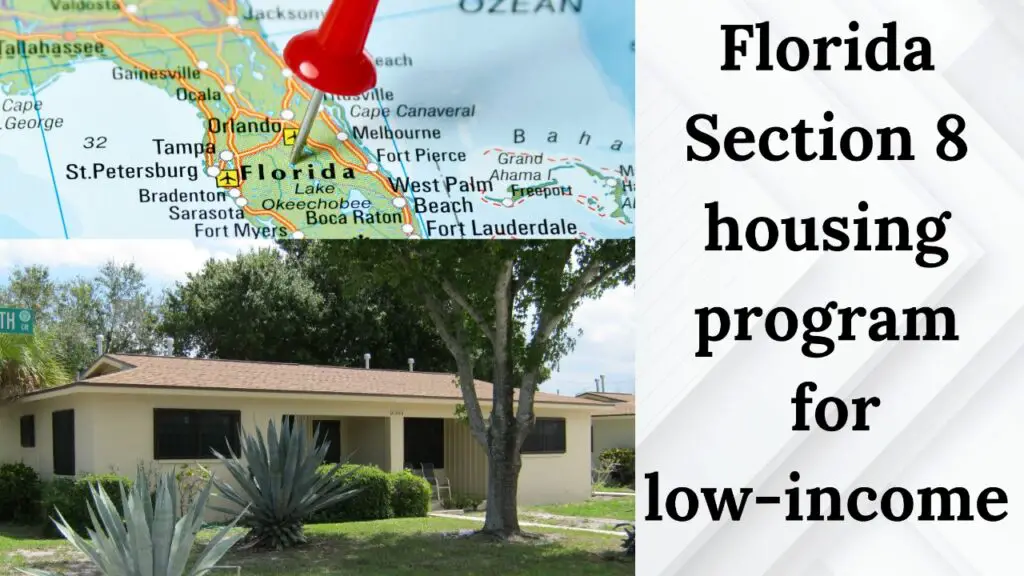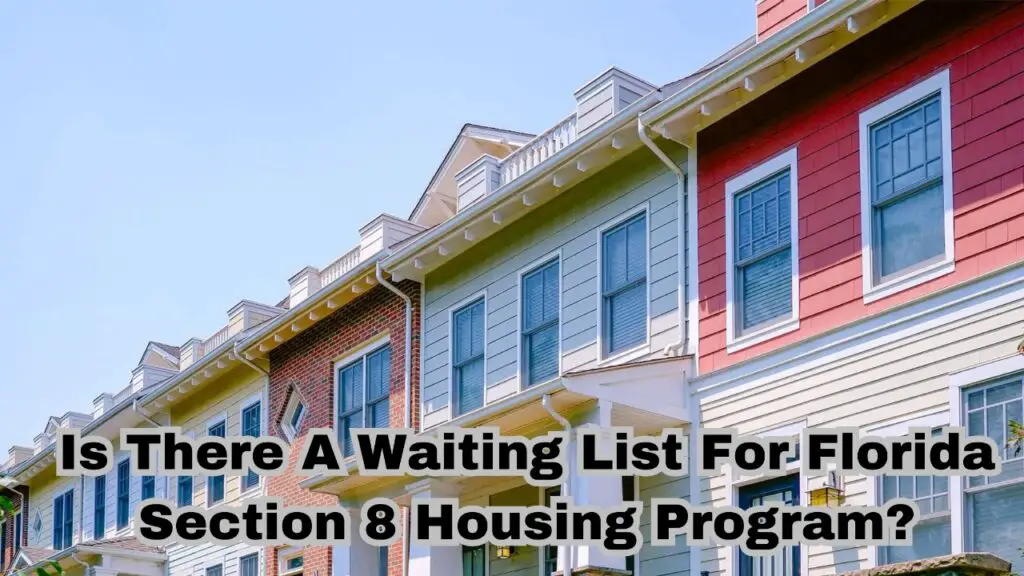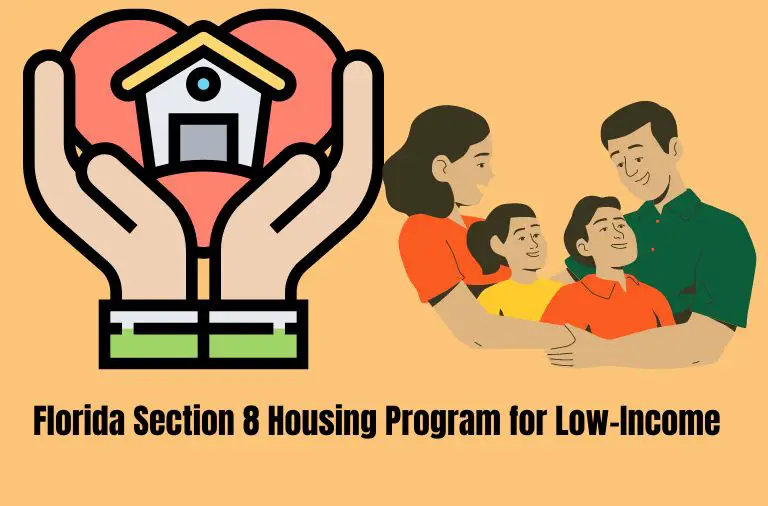Are you looking for Florida Section 8 Housing Program for Low-Income? If Yes, You are at the right place.
In this article, We are sharing all the information about Florida Section 8 Housing Program for Low-Income.
Florida Section 8 Housing Voucher Program helps low-income, disabled and elderly residents obtain affordable housing in the state. Families who qualify can choose a suitable rental unit and receive financial assistance with rent and utilities through a Section 8 housing choice voucher.
Despite this, Florida has a high demand for Section 8 assistance. In most cities, there are wait lists for aid. Here, we will discuss the Section 8 housing program for low-income residents in Florida. Let’s get started!
What Do You Mean By Low Income in Florida?
Some of Florida’s low-income programs are based on federal poverty guidelines. The U.S. Department of Health and Human Services (HHS) issues a poverty guideline annually based on a household’s size and income.
- Income below 80% of the median
- Income below 50% of the median
- A low income of 60% of the shallow income level and 30% of the median income.
Section 8 assistance is usually available to families with low or meagre incomes.
What Is The Section 8 Program?
Section 8 is a federal rent subsidy that helps low-income households pay their monthly rent.
Funds are received from the Housing and Urban Development Department (HUD) and distributed to eligible individuals and families as Section 8 Housing Choice Vouchers. Housing vouchers allow program participants to rent housing that caters for their needs at a reasonable price.
Families with eligible income must pay at least 30 per cent (and no more than 40 per cent initially) of their monthly adjusted income toward rent. Lakeland Housing Authority is responsible for paying the landlord the difference between the Contract Rent and the tenant’s share. The voucher will be forfeited if a tenant does not find housing within 120 days.
Lakeland Housing Authority determines eligibility based on household income and family composition. According to federal, state, and local laws, the landlord must screen the occupants for the rental unit.
The last step will be to sign the Housing Assistance Payments Contract once the unit has passed the H.Q.S. inspection. Once the case documents have been reviewed and processed, we will send you a contract detailing what the tenant will be responsible for paying and how much of the subsidy we will provide.
The owner must provide a copy of the signed lease and the Section 8 addendum also there are Private Landlords That Accept Section 8. According to the lease, each participant must pay their portion of the rent to the landlord on the first of every month. During the first week of each month, Lakeland Housing Authority will mail a portion of the rent directly to the landlord.
What is the Florida Section 8 housing program?
Section 8 Housing in Florida provides rental assistance to low-income families and individuals. Housing Choice Vouchers allow participants to find and rent housing from private landlords with government assistance. In this article, those seeking Section 8 housing in Florida will find information and resources.
For those who do not qualify for Section 8 or who are on the waiting list, we will discuss low-income housing options in Florida as well as eligibility requirements, income limits, market rents, and application procedures. This article provides valuable information to help you secure affordable housing in Florida, regardless of whether you are a participant in Section 8 or considering applying.
What is Florida Section 8 Housing Program for Low-Income?

In Florida, Section 8 housing provides affordable, safe and decent housing for low-income families, people with disabilities and seniors. The US Department of Housing and Urban Development funds the Housing Choice Voucher Program. Throughout the state of Florida, local public housing agencies administer the program and distribute vouchers.
How Does Florida Section 8 Housing Program for Low-Income Work?
Under the federal Section 8 program, public housing agencies in Florida pay a specific amount directly to landlords on behalf of eligible tenants. A tenant who meets the eligibility criteria is required to pay the remaining portion of their rent out of their own pockets. As part of their monthly income, candidates must pay 30% of their rent.
Rental units are regularly inspected by public housing authorities to ensure they meet HUD’s housing quality standards. Basic amenities like running water, heating and cooling systems, plumbing systems, and safe electrical systems are included in the housing standards.
The landlord must make necessary repairs and renovations before the tenant moves into the rental shifts if the rental unit fails the inspection. If the landlord fails to make the required repairs, the public housing authority may terminate the rental assistance payments.
Who Qualifies for Florida Section 8 Housing Program for Low-Income?
For applicants to be eligible for Section 8 housing in Florida, a few requirements need to be met. Housing authorities enforce these requirements on behalf of the federal government. A person’s income, citizenship status, and criminal history are all factors that determine eligibility.
Section 8 housing is primarily based on income limits. Depending on the county and size of the household, Florida’s income limits vary. In order to qualify for Section 8 housing, households must earn no more than 50% of the area’s median income. Section 8 is available to households earning no more than $44,100 per year in Miami-Dade County, for instance.
Furthermore, citizenship status and criminal history play an important role in eligibility. In order to apply, applicants must be U.S. citizens or have a valid immigration status. A recent conviction for a drug-related or violent crime is also required.
In Florida, Section 8 housing demand is often higher than the number of vouchers available. Therefore, there is usually a waiting list for Section 8 housing in Florida. To make sure you are not left waiting on the waiting list, you should apply as soon as possible and explore alternative low-income housing options.
What Do You Need to Qualify for Florida Section 8 Housing Program for Low-Income?
To qualify for Florida Section 8 Housing Program for Low-Income, you must meet certain eligibility requirements.
Income Eligibility
Section 8 eligibility is determined by income. A household’s income must be below a certain level in order to qualify for this new housing bill assistance.
According to HUD, income limits are determined by the Area Median Income (AMI) in the household’s area. Inflation is taken into account when determining the AMI, which is the midpoint of the income distribution in a given area.
Approximately $85,500 is the mean family income in Florida as of 2023. An individual’s low-income limit is $46,450, and a family’s low-income limit is $66,350 (80% of the median). If you are a single person, the very low-income limit is $29,000, and if you are a family of four, the very low-income limit is $41,450.
Individuals with extremely low incomes (30% of median) are limited to $17,400, and families with four are limited to $24,850. The income limits in Florida for 1-8 person households are listed here for low income, very low income, and extremely low income.
In order to determine whether a household is eligible for Section 8, its income is compared to the income limits for their area and family size. This calculation includes the income of all members of the household, including children.
Household Composition
Section 8 eligibility also depends on the composition of the household. Families, seniors, and people with disabilities who are living in poverty or at risk of homelessness can benefit from the program.
For a household to qualify for Section 8, at least one member must be a U.S. citizen or a non-citizen with eligible immigration status. It is also necessary for the household to meet the PHA’s definition of a family, which includes singles, couples without children, and families with children.
Criminal Background
The criminal background of the household is also considered when determining Section 8 eligibility, along with income and household composition. However, some criminal activities may prevent a household from being eligible for Section 8 benefits, regardless of whether a household has a criminal record.
All adult household members will undergo a background check and criminal history review by the PHA. Additionally, the PHA considers the nature and severity of the crime, the time since the conviction or release from prison, and the individual’s behaviour since the offence.
Violence and drug-related crimes can disqualify a household from Section 8. The PHA can approve applicants with criminal histories if they can demonstrate reintegration into society and are not a threat to their neighbours.
Housing History
As part of the Section 8 eligibility process, the PHA will also review the household’s housing history. PHAs may check the rental and payment history of the household with previous landlords.
Section 8 may not be available to households with evictions or unpaid rent history. Furthermore, the PHA will investigate any lease violations, such as damage to property or disruptive behaviour.
What Are The Documents Required To Qualify For Florida Section 8 Housing Program for Low-Income?
To determine eligibility, applicants must submit the following documents along with their application.
- Documents proving citizenship or legal immigration status
- Documents issued by the state government, such as an ID card, passport, school registration, and an original birth certificate
- All household members’ Social Security numbers
- Tax returns, wage statements, pay stubs, and bank statements verify the applicant’s and all household members’ incomes.
- Contact information for current and former landlords.
How to Apply for Florida Section 8 Housing Program for Low-Income?
Section 8 housing applications in Florida must be submitted through the local housing authority. Applicants are typically required to provide personal and financial information, as well as submit a criminal background check.
Section 8 applications can be submitted online through the Florida Department of Economic Opportunity’s website. Candidates can search for available housing opportunities and submit applications online through the website.
Section 8 housing in Florida applications can also be found at local housing authority offices in addition to online. Assisting with the application and answering any questions can also be provided by the housing authority office.
Section 8 housing may have a waiting list in Florida, and the length of the waiting list varies by location. In order to secure affordable housing, tenants should apply as soon as possible.
The Steps to Get Florida Section 8 Housing Program for Low-Income
Finally, your Section 8 housing choice voucher is ready to be received after your housing assistance has been approved. To receive assistance, you usually need to follow these steps.
Step 1: Complete an Interview
PHAs often conduct in-person interviews with applicants once their waiting list number is selected. Verifying your eligibility for assistance and updating your information are the primary purposes.
Step 2: Applicant Briefing
Some PHAs hold briefings to inform participants about vouchers and requirements for receiving assistance.
Step 3: Find a Suitable Home
Section 8 housing requirements must be met by all rentals. It is important to consider the rent reasonable. Sanitation and safety must be considered in the home.
Step 4: Pass the PHA Inspection
When using a voucher, the local housing authority should inspect the property to ensure it meets the program’s requirements.
Step 5: Sign the Lease
Once the landlord has completed the inspection, you can enter into a lease.
Step 6: Complete the Landlord and PHA Contract
Landlords will also enter into housing assistance payment contracts with local public housing authorities at the same time they sign the lease. Housing authorities may also require landlords to attend Landlord Briefings.
Step 7: Annual Inspections
A local PHA will schedule an annual inspection at least a few months before lease renewal. A housing inspector checks that the unit still complies with the program’s requirements. The PHA may also review your household income and family composition to determine whether you still qualify for assistance.
Are There Any Factors that Disqualify You from Section 8 Housing?
A household may be disqualified from receiving Section 8 housing assistance for additional reasons in addition to the eligibility requirements discussed above. A few of these factors are:
- Possessing significant assets or owning a home
- Full-time enrollment in college or university
- Housing authority or PHA debts owed to a household member
- Housing assisted by the federal government where an individual has been convicted of producing methamphetamine.
Is There A Waiting List For Florida Section 8 Housing Program for Low-Income?

Florida often has a long Section 8 waiting list. Many housing authorities in Florida have long waiting lists for vouchers because the demand for safe and affordable housing exceeds the supply.
Housing availability and safety in the state, population density, and Section 8 funding all affect how long it takes to reach the top of the waiting list. Waiting lists can last for months or even years.
As a result of the large number of applications received in Florida, some public housing agencies have closed their waiting lists. Based on the availability of affordable housing, candidates who meet the eligibility requirements will be placed on the waiting list and given a voucher for rent and housing costs. Also, you can apply for a Section 8 Housing Choice Voucher.
What is the Approval Process for Florida Section 8 Housing Program for Low-Income?
Florida Section 8 approval procedures include reviewing the applicant’s personal and financial information, confirming the applicant’s criminal background, investigating the applicant’s eviction history, and inspecting the proposed housing unit.
A Section 8 application’s approval timeframe may vary from two to four weeks, depending on funding availability, the number of applications received by housing agencies, and the accuracy of the information contained in the application. However, it may take several years in some cases.
In order to inquire about their application status, eligible tenants should contact their housing authorities. They will receive updates on their application and have their questions answered by housing authorities.
There are several housing authorities in the state of Florida with open waiting lists, including Palm Beach County Housing Authority, Jacksonville Housing Authority, Chipley Housing Authority, Tampa Housing Authority, St. Cloud Housing Authority, and Hillsborough County Affordable Housing Services.
What if My Claim is Rejected?
If your Section 8 claim is rejected, you can appeal the decision. For guidance on the appeals process, it is important to contact the appropriate agency or organisation.
Section 8 appeals must be submitted within a specified timeframe, typically 14 to 30 days after the decision date. To present your case, you may also have to attend an informal hearing or meeting, and a representative or advocate may be allowed to attend.
The appeals process requires additional documentation, such as medical bills, income or household changes or other extenuating circumstances. As the appeals process can take several weeks or months, patience and persistence are also essential.
When your appeal is denied, you might need to look for other housing assistance options, such as low-income housing programs, rental assistance programs, subsidised housing, or apply for disability benefits in Florida. To navigate the process, it’s important to stay informed and seek out local resources and support.
Other Low-income Housing Options in Florida
Section 8 housing may not be available to everyone living in Florida, and those on the waiting list may have other low-income housing options. Public housing, subsidised housing owned privately, and tax credit housing for those with low incomes are some of the options available.
In Florida, HUD housing is another option for low-income families and individuals. A Florida HUD housing application can be found on the HUD website, and information about HUD housing programs can be found there.
Florida offers low-income housing options along with HUD housing. The options include privately owned subsidised housing and low-income tax credit housing. The Affordable Housing Online website or the local housing authority can be used to locate available units.
To find the best low-income housing option in Florida, you should explore all available options.
FAQ’s
What Are the Qualifications for Section 8 Housing in Florida?
Florida Section 8 housing must be applied for first. You must provide household and financial information to determine if you qualify for assistance.
What is the Process for Applying for Section 8 Housing in Florida?
Section 8 applications are processed by your local PHA. Online applications are available at some PHAs, while paper applications are required by others.
What Are the Housing Requirements?
Housing can be paid for through Section 8, but only if it meets program requirements. To qualify, a housing unit must be safe and sanitary. Rent is also required to be paid by Section 8 voucher recipients at 30% of their adjusted income.
Conclusion
Low-income individuals and families in Florida can receive rental assistance through Section 8 housing. There are income limits, citizenship requirements, and criminal history requirements for Section 8. Depending on fair market rents and family income, Section 8 payments vary by location.
There are resources available to help you secure affordable housing in Florida, regardless of whether you are a Section 8 participant or considering the program. The best housing solution for your individual needs and circumstances can be found by exploring all available options and staying informed.


Add Comment